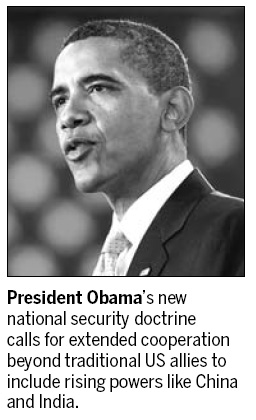Obama looks beyond borders

WASHINGTON - United States President Barack Obama on Thursday unveiled a new national security doctrine that would combine diplomacy and economics with military power.
Obama's strategy calls for expanding partnerships beyond traditional US allies to include rising powers like China and India in sharing international burdens, according to a document obtained by Reuters.
Faced with a struggling economy and record deficits, the administration also acknowledged that boosting economic growth and getting the US fiscal house in order must be top national security priorities.
The administration even reiterated Obama's determination to try to engage with "hostile nations" - a veiled reference to nuclear-defiant Iran and North Korea - but threatened to isolate them if they continued to defy international norms.
Obama, who took office faced with the worst financial crisis since the 1930s, took a clearer stand than any of his predecessors in drawing the link between America's economic health at home and its stature overseas.
"We must renew the foundation of America's strength," the document said, asserting that the sustained economic growth hinges on putting the country on a "fiscally sustainable path" and also urging reduced dependence on foreign oil.
There was no mention of what has become an emerging consensus in foreign policy circles - that heavy US indebtedness to countries like China poses a national security problem.
Bush used his first policy statement in 2002 to stake out the right to unilateral and pre-emptive military action against countries and terrorist groups deemed threats to the United States in the aftermath of the attacks on Sept 11, 2001.
Obama's plan distanced his administration from what became known as the Bush Doctrine and underpinned the 2003 US-led invasion of Iraq.
While renewing previous presidents' commitments to preserving US conventional military superiority, the doctrine laid out on Thursday put an official stamp on Obama's departure from what Bush's critics called "cowboy diplomacy."
"We need to be clear-eyed about the strengths and shortcomings of international institutions," the document said. But it insisted the US did not have the option to "walk away."
"Instead, we must focus American engagement on strengthening international institutions and galvanizing the collective action that can serve common interests such as combating violent extremism, stopping the spread of nuclear weapons and securing nuclear materials, achieving balanced and sustainable economic growth, and forging cooperative solutions to the threat of climate change," it said.
Obama's insistence the US cannot act alone in the world was also a message to current and emerging powers that they must shoulder their share of the burden.
Reuters
(China Daily 05/28/2010 page11)














